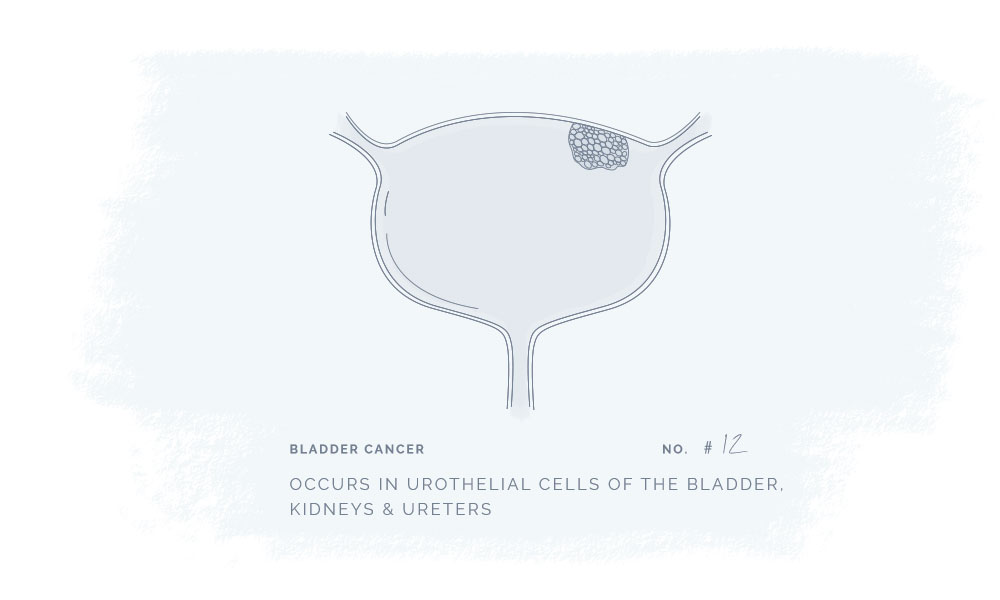
Bladder Cancer
Cancer

What is Bladder Cancer
Bladder cancer is a common type of cancer. It often occurs in the urothelial cells that line the inside of the bladder. However, as urothelial cells are also present in the kidneys and ureters, bladder cancer may occur there as well. It is easily treatable if diagnosed at an early stage, though, like other types of cancer, it may reoccur.
Symptoms
The signs and symptoms of cancer may be but not limited to:
- Frequent and/or painful urination
- Back pain
- Blood in urine
Cause
As other types of cancer, bladder cancer involves the growth of abnormal cells which contain mutations leading to uncontrollable cell division and growth. Similarly, it can spread and damage/destroy normal tissue.
Risk factors may be:
- Smoking or exposure to smoking
- Age, commonly diagnosed after the age of 55
- The sex, men are more likely to develop the cancer
- Exposure to specific chemicals
- Previous cancer treatment
- Chronic bladder inflammation (cystitis)
- Heredity
Bladder Cancer Symptoms
Frequent and/or painful urination, back pain, and blood in urine are among the most common.
Therapeutic Potential
Preclinical data suggests CBD and THC among other cannabinoids may be therapeutic for Bladder Cancer.
Application options
Depending on your needs, the optimal type of application may vary. Find more information on our application options.
The connection between Cannabinoids & Bladder Cancer
Studies find that CBD and THC may have great therapeutic potential and may be used to help treat Bladder Cancer. CBD and THC are well-known cannabinoids, however, they do not have the same psychoactive effects. THC is psychoactive while CBD does not possess psychoactive effects. According to WHO guidelines, the cannabidiol CBD is generally well tolerated with a good safety profile.
It is suggested that cannabinoids exhibit anti- metastatic activities. However, further studies are needed to examine the effect of CB2 agonists in the treatment of bladder cancer.

Literature Discussion
The literature discussion is an overview of the published results from scientific studies investigating if and how cannabinoids can be beneficial in the treatment of Bladder Cancer. The overview will be updated regularly to ensure the newest and most accurate information.
The potential of cannabinoids in treatment is still being investigated
The potential treatment of cannabinoids in bladder cancer is currently being studied by several research groups.
To this date, it is known that cannabinoid receptors such as CB1 , CB2 , and GPR55 are expressed by human bladder cells.
It was shown that human bladder cancer (BC) cells RT4 and RT112 have increased expression of CB2 receptors. Cytotoxicity in bladder cancer cell lines and changes in cellular sphingolipids metabolism can be induced via activation of CB2 with the synthetic cannabinoid agonist JWH015.
2AG plays a role in controlling inflammation and proliferation processes of bladder carcinoma cells, probably through cannabinoid receptors.
Clinical Trials
Clinical trials are research studies that examine new treatments and evaluate their effects on human health outcomes.
Today, we are not able to provide any clinical trials about cannabinoids and Bladder Cancer.
Cannabinoids & Receptors
Below you find the plant cannabinoids, cannabinoid receptors, and endocannabinoids that are associated with the potential therapy.
CBD
Cannabidiol (CBD) is a dominant cannabinoid in hemp. CBD does not possess psychoactive effects and does not make people high. CBD has been demonstrated to have potential as an alternative for several health-related conditions, including anxiety, pain, depression, among others.
THC
Tetrahydrocannabinol (THC) is a cannabinoid found in the cannabis plant. THC possesses psychoactive properties.
CB2
Cannabinoid receptors are located on the surface of cells in your body and they “listen” to conditions outside the cell. CB2 receptors are key players in the ECS. CB2 receptors are more abundant outside the nervous system, including cells of the immune system.
If you have any further information relevant to the connection between Bladder Cancer and cannabinoids or find any of the information inaccurate, outdated or incomplete please contact us here
References
- https://www.mayoclinic.org/diseases-conditions/bladder-cancer/symptoms-causes/syc-20356104
- Bettiga, A., Et al. (2017). ” Bladder cancer cell growth and motility implicate cannabinoid 2 receptor-mediated modifications of sphingolipids metabolism”. https://www.ncbi.nlm.nih.gov/pmc/articles/PMC5304189/
- Bakali et al., (2014). “Human urothelial cell lines as potential models for studying cannabinoidand excitatory receptor interactions in the urinary bladder. Naunyn. Schmiedebergs Arch. Pharmacol. 387, 581–589”. https://link.springer.com/article/10.1007/s00210-014-0973-5
- Gasperi et al., (2014). “Regulation of inflammation and proliferation of human bladder carcinoma cells by type-1 and type-2 cannabinoid receptors. Life Sci”. https://pubmed.ncbi.nlm.nih.gov/25445433/
